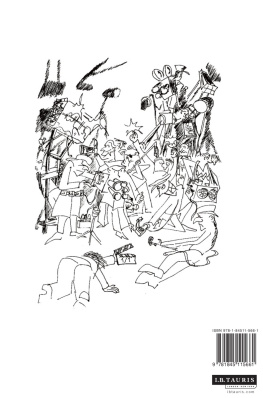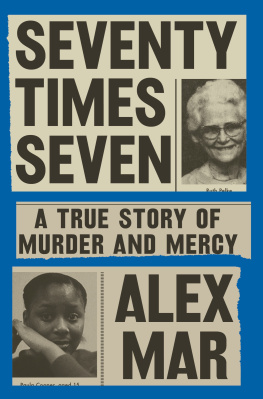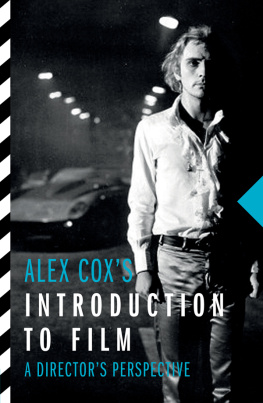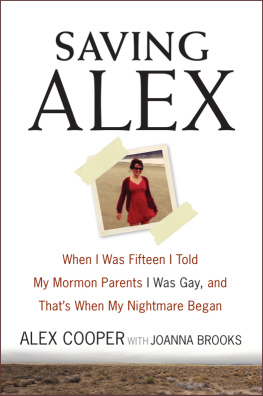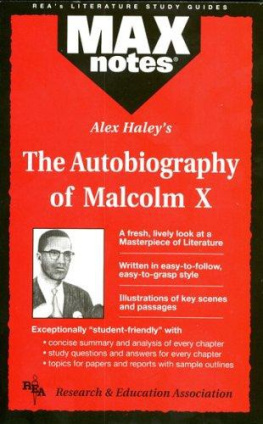Cox Alex - Alex Cox X films : true confessions of a radical filmmaker
Here you can read online Cox Alex - Alex Cox X films : true confessions of a radical filmmaker full text of the book (entire story) in english for free. Download pdf and epub, get meaning, cover and reviews about this ebook. City: London, Great Britain, year: 2008, publisher: I.B.Tauris, genre: Non-fiction. Description of the work, (preface) as well as reviews are available. Best literature library LitArk.com created for fans of good reading and offers a wide selection of genres:
Romance novel
Science fiction
Adventure
Detective
Science
History
Home and family
Prose
Art
Politics
Computer
Non-fiction
Religion
Business
Children
Humor
Choose a favorite category and find really read worthwhile books. Enjoy immersion in the world of imagination, feel the emotions of the characters or learn something new for yourself, make an fascinating discovery.
- Book:Alex Cox X films : true confessions of a radical filmmaker
- Author:
- Publisher:I.B.Tauris
- Genre:
- Year:2008
- City:London, Great Britain
- Rating:4 / 5
- Favourites:Add to favourites
- Your mark:
- 80
- 1
- 2
- 3
- 4
- 5
Alex Cox X films : true confessions of a radical filmmaker: summary, description and annotation
We offer to read an annotation, description, summary or preface (depends on what the author of the book "Alex Cox X films : true confessions of a radical filmmaker" wrote himself). If you haven't found the necessary information about the book — write in the comments, we will try to find it.
Cox Alex: author's other books
Who wrote Alex Cox X films : true confessions of a radical filmmaker? Find out the surname, the name of the author of the book and a list of all author's works by series.
Alex Cox X films : true confessions of a radical filmmaker — read online for free the complete book (whole text) full work
Below is the text of the book, divided by pages. System saving the place of the last page read, allows you to conveniently read the book "Alex Cox X films : true confessions of a radical filmmaker" online for free, without having to search again every time where you left off. Put a bookmark, and you can go to the page where you finished reading at any time.
Font size:
Interval:
Bookmark:

FOR TOD DAVIES
Published in 2008 by I.B.Tauris & Co Ltd
6 Salem Road, London W2 4BU
175 Fifth Avenue, New York NY 10010
www.ibtauris.com
Copyright 2008 Alex Cox
The right of Alex Cox to be identified as the author of this work has been asserted by him in accordance with the Copyright, Designs and Patent Act 1988.
All rights reserved. Except for brief quotations in a review, this book, or any part thereof, may not be reproduced, stored in or introduced into a retrieval system, or transmitted, in any form or by any means, electronic, mechanical, photocopying, recording or otherwise, without the prior written permission of the publisher.
ISBN 978 1 84511 566 1
eISBN: 978 0 85773 039 8
A full CIP record for this book is available from the British Library
Typeset by JCS Publishing Services Ltd, www.jcs-publishing.co.uk
This book is about 10 films I made. Its called X Films because I like the Roman numeral, because I have two Xs in my name, and because it reminds me of the banned, adults-only films of my childhood mainly horror films and Spaghetti Westerns. Not all of these were revolutionary films. But some were.
I grew up with a passion for the pictures, and for weird, marginal, independent films. The 90-minute form is the length of our dream cycle, were told. As Buuel and Dal knew, theres something particularly empowering and exciting about telling stories that resemble dreams. The cinemas I was raised in were real buildings: often huge, with vast, nicotine-yellow screens, and I would head upstairs to the circle, or down to the stalls, and watch two films a double feature through rising trails of cigarette smoke.
Going to the cinema today is a more ordered affair. The cinemagoer is forced to undergo a shopping experience, sees only one film instead of two, pays a lot more for it, and endures a barrage of loud, assaultive ads before the film begins. Its this advertising, along with sales of highly salted, shit-smelling popcorn, and sugared water, that makes the cinema chains their money. Only the studio-distributors make money from the films themselves.
Talking to students and younger people now, I get the impression that they think a film is given to a filmmaker by a studio, or a production company. This is not so. If youre a real filmmaker, a film is something that you personally conceive, and then, in partnership with similarly minded colleagues, make yourself. It might be shot on film, or digital video. It might be 19 minutes or 370 minutes in duration (Id recommend 8095). It is entirely within your power to make an independent feature film, as long as you belong to one of two groups. To pull it off, you must be either:
1) a vocational filmmaker, affronted by Hollywood and its power, caring little about money or rewards, determined to tell your own tale; or
2) a computer (or other) hacker, because hackers are brave and curious, and not afraid of acquiring, applying, and sharing information.
I include hackers because I suspect that feature film is dead, or dying, and that new blood and brains are needed to bring the twitching corpse-thing back to life. In the last few years Ive learned a great deal from hackers: from 2600, from Richard Stallman, from Lawrence Lessig, from The Cathedral & The Bazaar and I believe were hoeing the same row. Most of what I know about the loss of my civil liberties Ive learned from computer magazines: only here, on a monthly basis, can the general reader learn about the destruction of the fair use doctrine, about abuse of patent and copyright law, about the monopoly power-grabs of Microsoft and other corporations, whose stupidity and cupidity rival the Pentagons. Patents and copyrights are complex things, far too difficult for Guardian or New York Times reporters to understand, so its a good thing we still have Computer Shopper to remind us that were being screwed.
Today, an independent filmmaker is a revolutionary fighter, in a prolonged popular war. This is the same war that Free Software and GNU/Linux activists fight against Microsoft; that the Slow Food movement fights against McDonalds; that independent musicians fight against the RIAA (Recording Industry Association of America) and the Apple Music Store; that Fairtrade activists fight against WalMart and the WTO; that the Zapatistas fight against patriarchal systems of control in Mexico. There are no spoils to be had on this battlefield, and no prospect of a quick and easy victory. Yet, buoyed by belief, and by the lack of a sustainable or sane alternative, the guerrilla soldiers on. In the case of feature films, the battle for an independent, personal art form is already won (thanks to the Mini DV tape and the DVD), lost (thanks to the studios and their admirers), but irrelevant anyway.
Irrelevant because the feature film was the original art form of the twentieth century. It cant be the original art form of the twenty-first as well. Something that goes beyond it will displace it some medium equally visual and visceral, but interactive, with multiple narrative possibilities. Its already being born: out in the same uncharted territory as the computer game, the readjusted corporate website, and the home-made CD of illegal MP3s. But the birth wont be easy, and the new form is destined for a long and hard-fought war.
Lined up against the development of new art forms are the financial beneficiaries of the old: the studios and record companies, and the politicians, academics and media who work for them. Their world is already dying. Soon it will be gone. In the meantime, there are still a few jobs to be had there. This is the filmmakers choice dependency, and the money which comes with it, or independence, which may involve lean times.
At the same time, as the studios retrench, consolidate, and fight for dominance in a diminishing market, it becomes even more important for them to suppress the individual, or regional, voice. In some countries, the idea of film as a distinctive, national art form has been abandoned.
The British and the Mexicans face the most acute cultural challenge. Mexico suffers from its military and economic weakness and geographical proximity to the US; Britain suffers from a common language and from a ruling class that is scared to defy the biggest bully in town. As a result, our governments and cultural classes invariably bow to American influence. Instead of encouraging regional voices and developing new creative forms, they gather in secure redoubts in the capital city and assist in the creation of amnesia, in the effort to wash away our feelings and our brains.
Rather than encouraging new forms to develop in film, in art, in science, in copyright law our leaders, cultural and political, seek to enshrine the old. In film and television, the entire panoply of human emotion is carved up into bite-size segments serving a massive, antiquated, violence-fixated Hollywood fast-food chain that Peter Watkins has called the Monoform.
On Paul Robesons tombstone are the words, The artist must elect to fight for freedom or slavery. I made my choice. I had no alternative. What this great actor said applies to directors, to writers, to journalists, and indeed to almost everybody. But not everyone is in the fortunate position of the artist, able to weigh the political implications of each possible job, and to accept or reject the work accordingly. The choices that we make, as artists, hackers, or filmmakers, are visible in our work. No one is forced to make a film.
Slavery is profitable. Freedom is difficult. Money is plentiful for those who promote obedience; its in short supply for those who disobey. And yet, all over the world, people refuse to be slaves, and give up careers, and even lives, because their sense of self-worth, or their communitys survival, obliges them to.
Font size:
Interval:
Bookmark:
Similar books «Alex Cox X films : true confessions of a radical filmmaker»
Look at similar books to Alex Cox X films : true confessions of a radical filmmaker. We have selected literature similar in name and meaning in the hope of providing readers with more options to find new, interesting, not yet read works.
Discussion, reviews of the book Alex Cox X films : true confessions of a radical filmmaker and just readers' own opinions. Leave your comments, write what you think about the work, its meaning or the main characters. Specify what exactly you liked and what you didn't like, and why you think so.

